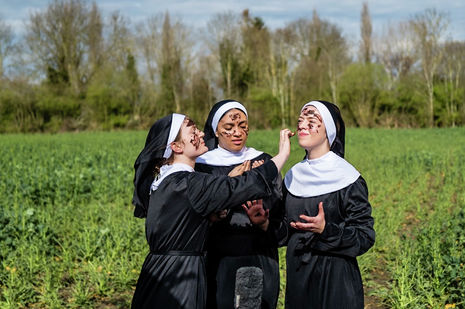Nuns, goldfish and hallucinogens: Behind the scenes of Bad Habit
Eva Weinstein sits down with student filmmakers Mercy Brewer and Jake Thakur to discuss their new short film

On a sun-drenched Saturday, with Easter term teetering towards exams, I met Mercy Brewer and Jake Thakur outside Michaelhouse – a location befitting our conversation for its ecclesiastical resonance, echoing the churchly settings of their upcoming film, Bad Habit. As students across the university were buried in revision, these filmmakers were neck-deep in the final touches to their short film.
Bad Habit sounds like a brainstorm born from a fever dream. The film ventures into the world of a convent in chaos in the year 1422, where the mysterious disappearance of Sister Juliana leads to a confession booth exposé. The premise is as audacious as it sounds: “Mushroom trip, amnesia nun, goldfish… We almost reverse engineered it from there,” Jake explains.
The narrative unfolds through a series of confessions – a clever plot device that turns the traditional mystery on its head. Instead of detectives, we have nuns; instead of a smoking gun, we have a goldfish. The result? An anachronistic blend of medieval mystery and modern absurdity, a mix that Mercy attributes to historical curiosity: “I was doing mediaeval stuff for my dissertation. It’s such a wacky, carnage period of history.”
“Mushroom trip, amnesia nun, goldfish… We almost reverse engineered it from there”
The project originated from a blend of ambition and nostalgia. “We were both graduating… and Mercy was like, ‘I really want to make a film in Cambridge with all these buildings we had access to’,” Jake recalls. The narrative is playful yet reflective, fusing historical architecture with a whimsical plot that dances the line between surreal and sacred. Mercy and Jake drew inspiration from eclectic sources: “I love a little period drama that just does things a bit differently,” Mercy shares, “but there’s a gap in the market – there’s a lot of horror but not a lot of nun comedy.” Inspirations ranged from the storytelling of period pieces like Emma and The Favourite to the avant-garde visuals of an FKA Twigs music video.
The duo secured the Leper Chapel as the primary filming location. Nestled near Cambridge’s bustling football stadium and laden with history as a hospital, market, pub and church, the chapel resonated deeply with the film’s themes. “It’s just next to a main road and is the second oldest building in Cambridge,” Jake reveals.
Production days were as chaotic as they were creative, often starting before daybreak. “Alarm goes at 5am. After not getting the most sleep because you’re thinking about all the things that could go wrong, you wake up,” Jake recounted, “You feel like you’ve solved problems in your sleep. You have no voice because it’s completely gone from shouting at girls running away in the field.”
As they navigated fickle British weather and last-minute cast changes, the importance of adaptability became clear. “You go through the shot list for the day, have a couple of people message saying that they’re ill so rope all your friends in,” Mercy shared, revealing the often improvisational nature of managing a film set.
Despite these hurdles, the inclusion of a seasoned director of photography became a game changer. Armed with borrowed equipment, a van hired from London and cinematography direction described as “hardcore but effective”, their ambitious project was transformed into a professional-grade film. “We managed to find a fantastic DP… That is the reason why it’s not just a proof of concept but it’s turned into something that looks really cool,” Mercy explained.
But the path to producing a student film in Cambridge certainly isn’t paved with gold – or any funding, really. The film benefitted from an infrastructure largely designed for theatre, adapted to support a film of this ambition. “We got support from lots of different funding bodies, especially the Shadwell Society… You don’t get big societies in film like you do in theatre,” Mercy explains, emphasising the disparity between the two arts at Cambridge.
“I was doing mediaeval stuff for my dissertation. It’s such a wacky, carnage period of history”
For those looking to get involved with film in Cambridge, Mercy offers a piece of wisdom: “Plan, plan, plan and then plan some more. Make sure everybody is free on your shooting days.” Jake adds, “Find a good DP who knows what they’re doing and get in touch with other people who have done the same thing with niche technical knowledge.” Mercy stresses the importance of making short films: “I think short films interest me because I didn’t know that people didn’t just go and make an hour-and-a-half-long feature. I didn’t realise until a year or so ago that people have to make short films to get anything done.”
Bad Habit premieres today, at an event which promises to be more than just a screening, with an accompanying art exhibition inviting broader participation. Mercy emphasises the inclusive, community-driven nature of the showcase: “People can submit anything like collages, photography, poems… And then we’ll be displaying them at our screening.”
It’s not every day you hear of a period piece promising hallucinogens and aquatic pets, setting the stage for a truly memorable debut.
 News / Judge Business School advisor resigns over Epstein and Andrew links18 February 2026
News / Judge Business School advisor resigns over Epstein and Andrew links18 February 2026 News / Hundreds of Cambridge academics demand vote on fate of vet course20 February 2026
News / Hundreds of Cambridge academics demand vote on fate of vet course20 February 2026 News / Petition demands University reverse decision on vegan menu20 February 2026
News / Petition demands University reverse decision on vegan menu20 February 2026 News / CUCA members attend Reform rally in London20 February 2026
News / CUCA members attend Reform rally in London20 February 2026 News / Gov grants £36m to Cambridge supercomputer17 February 2026
News / Gov grants £36m to Cambridge supercomputer17 February 2026










